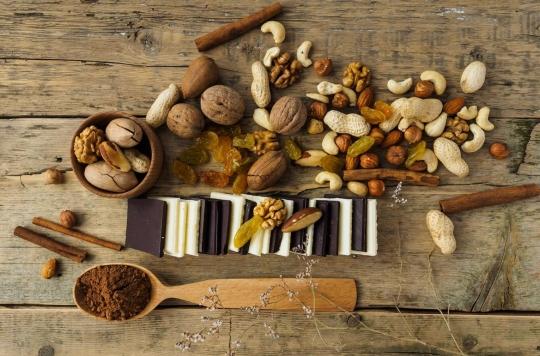Cocoa flavanols boost brain oxygenation and cognition in adults. Eating nuts is linked to better diet quality and good markers of health.

- After ingesting the cocoa flavanols, participants performed better on the most difficult cognitive tests, solving problems correctly 11% faster.
- Eating the flavanol found in cocoa allows for a stronger and faster cerebral oxygenation response
- Dried fruits are a credible alternative to fruits and lead to a better diet
Eat well to be healthy. Cocoa flavanols and fruits fall into the category of foods good for our health. The first is good for our brain since it participates in its good oxygenation and boosts adult cognition. Eating dried fruits contributes to better health and leads to the consumption of better foods.
Flavanols, good for cerebrovascular function
Flavanols are small molecules present in many fruits and vegetables as well as in cocoa which protect them against oxidation and aggressive solar rays, and contribute to giving flavor to these foods. Consuming cocoa flavanols, reported the British and American researchers who carried out the study published on November 24 in Scientific Reports, allows our brain to recover faster after a vascular incident and to perform better on complex tests. “Previous studies have shown that consuming flavanol-rich foods may benefit vascular function, but this is the first to find a positive effect on cerebrovascular function and cognitive performance in healthy young adults.”, welcomed Catarina Rendeiro, who led the research.
In the study, 14 out of 18 participants saw improvements after ingesting the flavanols. The testing took place across two trials, one in which they were given cocoa rich in flavanols and another where they consumed processed cocoa with very low levels of flavanols. About two hours after consuming the cocoa, the participants breathed in air containing 5% carbon dioxide – about 100 times the normal concentration in air. “This is a standard method for challenging the cerebrovascular system to determine how well it responds”, justified Gabriele Gratton, co-author of the study.
Better cognitive performance thanks to flavanols
Most participants (14 out of 18) had a stronger and faster cerebral oxygenation response after exposure to cocoa flavanols. “Peak oxygenation levels were more than three times higher in high flavanol cocoa than in low flavanol cocoa, and the oxygenation response was approximately one minute faster”, noted Catarina Rendeiro. Researchers also challenged participants with complex tasks that required them to manage sometimes conflicting or competing demands. After ingesting the cocoa flavanols, participants performed better on the most difficult cognitive tests, correctly solving problems 11% faster than they did at baseline or when consuming cocoa with flavanols reduced.
“Although most people benefited from flavanol intake, there is a small group that did not.”, exposed Catarina Rendeiro. Four of the 18 study subjects did not have significant differences in brain oxygenation response after consuming flavanols and their test performance did not improve. “Because these four participants already have higher oxygenation responses to begin with, this may indicate that those who are already fit have little room for improvement.said Catarina Rendeiro. Overall, the results suggest that improvements in vascular activity after exposure to flavanols are related to improved cognitive function..”
Dried fruits, a credible alternative to fruit
Besides flavanols, dried fruits are also associated with improved health. Researchers from Pennsylvania State University, who presented their work on October 28 in the Journal of the Academy of Nutrition and Dietetics, found that nut eaters are generally healthier than non-nut eaters and that this leads these people to eat better. “Dried fruits can be a great choice for a nutritious snack but consumers may want to be sure to choose unsweetened versions with no added sugaradvances Valerie Sullivan, author of the study. Dried fruits can potentially help people consume more fruit because they are portable, shelf-stable, and may even be cheaper.”
Researchers have investigated whether dried fruits can be a healthy alternative to fresh fruits and their multiple benefits for our body. The team of researchers used data on 25,590 participants in a national health and nutrition survey. These participants provided data on all foods they ate in the previous 24 hours, including dried fruits. Data was also collected on the volunteers’ cardiometabolic health – such as body mass index, waist circumference and blood pressure – and the quality of their overall diet.
Pay attention to the calories
On average, people who reported consuming dried fruit had a healthier diet than those who did not. They also tend to have lower body mass index, waist circumference, and systolic blood pressure. “What I also found interesting is that people tend to eat more fruit in total on days when they also eat dried fruit”, observed Valerie Sullivan. On days when dried fruit was not consumed, however, fresh fruit consumption was not higher. Dried fruits could therefore be a way to increase overall fruit intake in people who do not eat the recommended amounts..”
However, researchers found that people consumed more total calories on days when they ate dried fruit. “In our study, people who ate dried fruit had higher calorie intake but lower BMI and waist circumference, suggesting they were more physically active.analyzed Penny Kris-Etherton, author of the study. So, when incorporating dried fruit, pay attention to calories and make sure to replace calories from nutrient-poor foods with dried fruit to get the most benefit from consuming dried fruit..”















